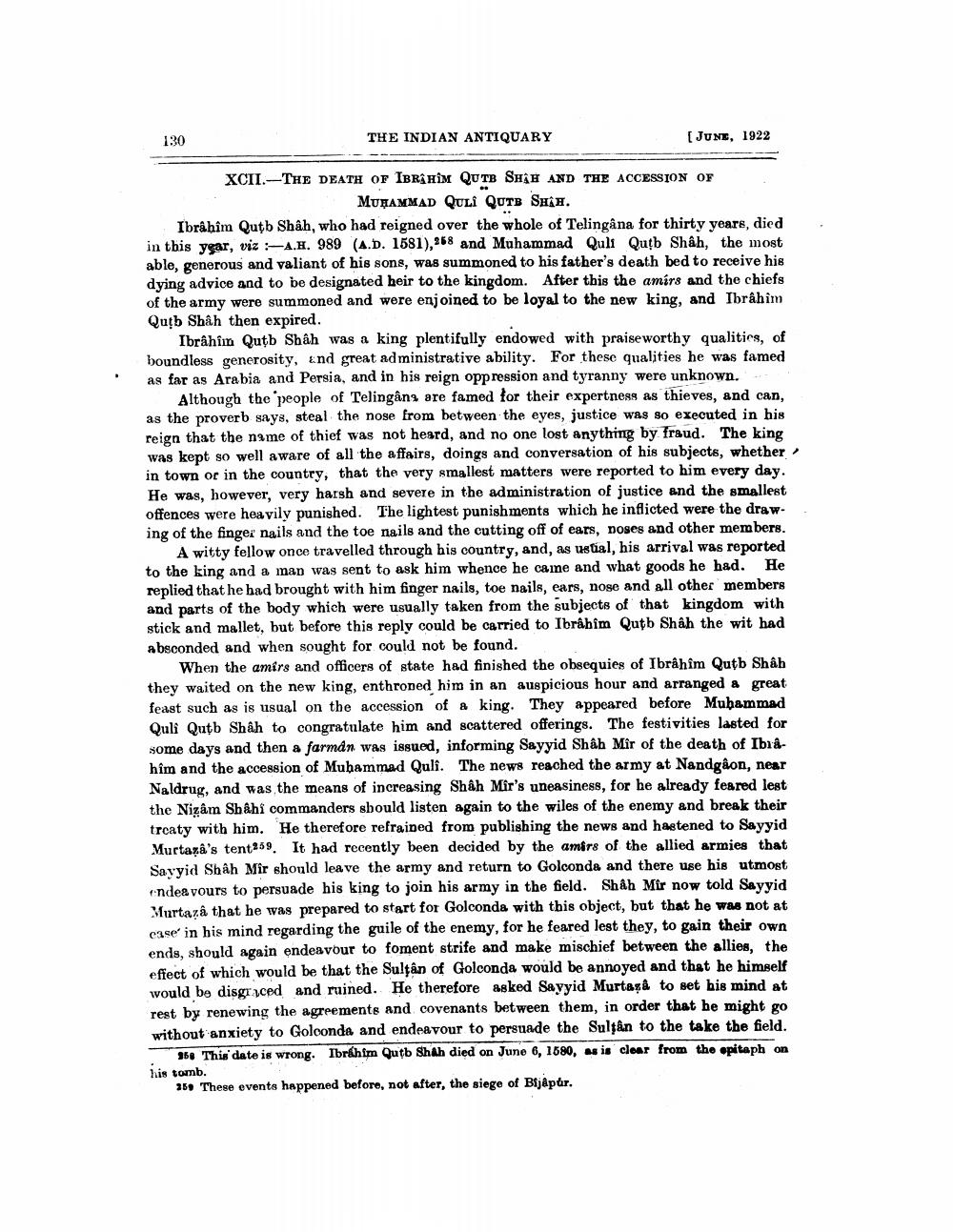________________
130
THE INDIAN ANTIQUARY
[JUNE, 1922
XCII.--THE DEATH OF IBRÎHÎM QUTB SHE AND THE ACCESSION OF
MUĦAMMAD QULI QUTB SHH. Ibrâhîm Qutb Shâh, who had reigned over the whole of Telingana for thirty years, died in this year, viz -A.H. 989 (A.D. 1581), 258 and Muhammad Quli Qutb Shâh, the most able, generous and valiant of his sons, was summoned to his father's death bed to receive his dying advice and to be designated heir to the kingdom. After this the amirs and the chiefs of the army were summoned and were enjoined to be loyal to the new king, and Ibrahim Qutb Shâh then expired.
Ibrâhim Qutb Shâh was a king plentifully endowed with praise worthy qualities, of boundless generosity, and great administrative ability. For these qualities he was famed as far as Arabia and Persia, and in his reign oppression and tyranny were unknown.
Although the people of Telingâns are famed for their expertness as thieves, and can, as the proverb says, steal the nose from between the eyes, justice was so executed in his reign that the name of thief was not heard, and no one lost anything by fraud. The king was kept so well aware of all the affairs, doings and conversation of his subjects, whether in town or in the country, that the very smallest matters were reported to him every day. He was, however, very harsh and severe in the administration of justice and the smallest offences were heavily punished. The lightest punishments which he inflicted were the draw ing of the finger nails and the toe nails and the cutting off of ears, noses and other members.
A witty fellow once travelled through his country, and, as ustial, his arrival was reported to the king and a man was sent to ask him whence he came and what goods he had. He replied that he had brought with him finger nails, toe nails, ears, nose and all other members and parts of the body which were usually taken from the subjects of that kingdom with stick and mallet, but before this reply could be carried to Ibrahim Qutb Shâh the wit had absconded and when sought for could not be found.
When the amîrs and officers of state had finished the obsequies of Ibrâhim Qutb Shah they waited on the new king, enthroned him in an auspicious hour and arranged a great feast such as is usual on the accession of a king. They appeared before Muhammad Quli Qutb Shah to congratulate him and scattered offerings. The festivities lasted for some days and then a farman was issued, informing Sayyid Shâh Mir of the death of Ibrahim and the accession of Muhammad Quli. The news reached the army at Nandgaon, near Naldrug, and was the means of increasing Shâh Mir's uneasiness, for he already feared lest the Nizâm Shâhi commanders should listen again to the wiles of the enemy and break their treaty with him. He therefore refrained from publishing the news and hastened to Sayyid Murtara's tent259. It had recently been decided by the amirs of the allied armies that Sayyid Shah Mir should leave the army and return to Goloonda and there use his utmost
ndeavours to persuade his king to join his army in the field. Shâh Mir now told Sayyid Murtaza that he was prepared to start for Golconda with this object, but that he was not at case in his mind regarding the guile of the enemy, for he feared lest they, to gain their own ends, should again endeavour to foment strife and make mischief between the allies, the effect of which would be that the Sultan of Golconda would be annoyed and that he himself would be disgraced and ruined. He therefore asked Sayyid Murtard to set his mind at rest by renewing the agreements and covenants between them, in order that he might go without anxiety to Goloonda and endeavour to persuade the Sultân to the take the field.
356 This' date is wrong. Ibrahim Qutb Shah died on June 6, 1680, as is clear from the epitaph on his tomb.
356 These events happened before, not after, the siege of Bijapur.




